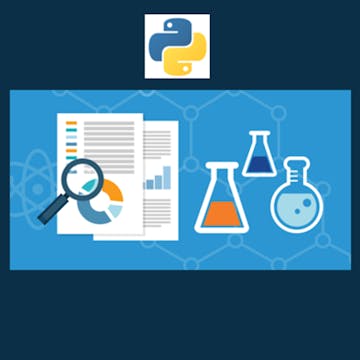
ستمنحك دورة مشروع الكابستون هذه لمحة عما يمرّ به علماء البيانات في الحياة الواقعية عند التعامل مع البيانات.
ستتعرف على بيانات الموقع ومقدمي بيانات الموقع المختلفين، مثل فورسكوير. ستتعرف على طريقة إجراء اتصالات واجهة برمجة تطبيقات RESTful لواجهة برمجة تطبيقات فورسكوير لاسترداد البيانات حول أماكن في أحياء مختلفة حول العالم. ستتعلم أيضًا كيف تكون مبدعًا في المواقف التي لا تكون فيها البيانات متاحة بسهولة من خلال استخلاص بيانات الويب وتحليل كود HTML. ستستخدم بايثون ومكتبة الباندا الخاصة بها لمعالجة البيانات، وهو ما سيساعدك في صقل مهاراتك الخاصة باستكشاف البيانات وتحليلها.
وأخيرًا، سيُطلب منك استخدام مكتبة فوليوم للحصول على خرائط...
Read more
Good to know
Save this course
Activities
Review basic probability and statistics concepts.
Show steps
Refreshing your understanding of basic probability and statistics concepts will help you better understand the material in this course.
Browse courses on
Probability
Show steps
-
Review your notes from a previous probability and statistics course.
-
Take a practice quiz on basic probability and statistics concepts.
Review the material from the previous course in this sequence.
Show steps
Reviewing the material from the previous course in this sequence will help you refresh your memory and build on your existing knowledge.
Show steps
-
Review your notes from the previous course.
-
Take a practice quiz on the material from the previous course.
Read 'A Field Guide to Data Science'
Show steps
Concepts explored throughout this book will enhance your understanding of concepts such as data visualization and working with code.
View
A Practitioner's Guide to State and Local...
on Amazon
Show steps
-
Read and take notes on the introduction.
-
Read and complete the exercises in chapters 1-5.
Five other activities
Expand to see all activities and additional details
Show all eight activities
Join a study group to discuss course material.
Show steps
Joining a study group can provide you with opportunities to discuss the course material with other students and get help with concepts you don't understand.
Show steps
-
Find a study group to join.
-
Attend study group meetings.
-
Participate in discussions.
Watch the 'Pandas Tutorial' series on YouTube.
Show steps
Watching these tutorials will help you gain a solid understanding of how to use Pandas to manipulate data.
Browse courses on
Pandas
Show steps
-
Watch the first tutorial in the series.
-
Complete the exercises in the tutorial.
-
Repeat steps 1 and 2 for the remaining tutorials in the series.
Complete the practice problems in the course textbook.
Show steps
Solving practice problems can help you build proficiency and confidence in working with code.
Show steps
-
Review the material in the textbook chapter.
-
Attempt to solve the practice problems.
-
Check your answers against the answer key.
-
Review the solutions to any problems you got wrong.
Write a blog post about a data science project you've worked on.
Show steps
Documenting your work will aid in helping you retain information learned throughout this course.
Browse courses on
Data Science
Show steps
-
Brainstorm ideas for your blog post.
-
Write an outline for your blog post.
-
Write the first draft of your blog post.
-
Edit and revise your blog post.
-
Publish your blog post.
Create a data visualization dashboard using Plotly.
Show steps
Creating a data visualization dashboard will require you to apply the concepts and techniques learned in this course.
Browse courses on
Data Visualization
Show steps
-
Gather the data you want to visualize.
-
Clean and prepare the data.
-
Create a Plotly visualization.
-
Deploy your dashboard.
Review basic probability and statistics concepts.
Show steps
Refreshing your understanding of basic probability and statistics concepts will help you better understand the material in this course.
Browse courses on
Probability
Show steps
- Review your notes from a previous probability and statistics course.
- Take a practice quiz on basic probability and statistics concepts.
Review the material from the previous course in this sequence.
Show steps
Reviewing the material from the previous course in this sequence will help you refresh your memory and build on your existing knowledge.
Show steps
- Review your notes from the previous course.
- Take a practice quiz on the material from the previous course.
Read 'A Field Guide to Data Science'
Show steps
Concepts explored throughout this book will enhance your understanding of concepts such as data visualization and working with code.
View
A Practitioner's Guide to State and Local...
on Amazon
Show steps
- Read and take notes on the introduction.
- Read and complete the exercises in chapters 1-5.
Join a study group to discuss course material.
Show steps
Joining a study group can provide you with opportunities to discuss the course material with other students and get help with concepts you don't understand.
Show steps
- Find a study group to join.
- Attend study group meetings.
- Participate in discussions.
Watch the 'Pandas Tutorial' series on YouTube.
Show steps
Watching these tutorials will help you gain a solid understanding of how to use Pandas to manipulate data.
Browse courses on
Pandas
Show steps
- Watch the first tutorial in the series.
- Complete the exercises in the tutorial.
- Repeat steps 1 and 2 for the remaining tutorials in the series.
Complete the practice problems in the course textbook.
Show steps
Solving practice problems can help you build proficiency and confidence in working with code.
Show steps
- Review the material in the textbook chapter.
- Attempt to solve the practice problems.
- Check your answers against the answer key.
- Review the solutions to any problems you got wrong.
Write a blog post about a data science project you've worked on.
Show steps
Documenting your work will aid in helping you retain information learned throughout this course.
Browse courses on
Data Science
Show steps
- Brainstorm ideas for your blog post.
- Write an outline for your blog post.
- Write the first draft of your blog post.
- Edit and revise your blog post.
- Publish your blog post.
Create a data visualization dashboard using Plotly.
Show steps
Creating a data visualization dashboard will require you to apply the concepts and techniques learned in this course.
Browse courses on
Data Visualization
Show steps
- Gather the data you want to visualize.
- Clean and prepare the data.
- Create a Plotly visualization.
- Deploy your dashboard.
Career center
Data Scientist
Machine Learning Engineer
Business Analyst
Statistician
Data Architect
Software Engineer
Data Analyst
Financial Analyst
Data Engineer
Information Management
Data Management
Data Governance
Risk and Compliance
Information Security
Cybersecurity
Reading list
Share
Similar courses
OpenCourser helps millions of learners each year. People visit us to learn workspace skills, ace their exams, and nurture their curiosity.
Our extensive catalog contains over 50,000 courses and twice as many books. Browse by search, by topic, or even by career interests. We'll match you to the right resources quickly.
Find this site helpful? Tell a friend about us.
We're supported by our community of learners. When you purchase or subscribe to courses and programs or purchase books, we may earn a commission from our partners.
Your purchases help us maintain our catalog and keep our servers humming without ads.
Thank you for supporting OpenCourser.



